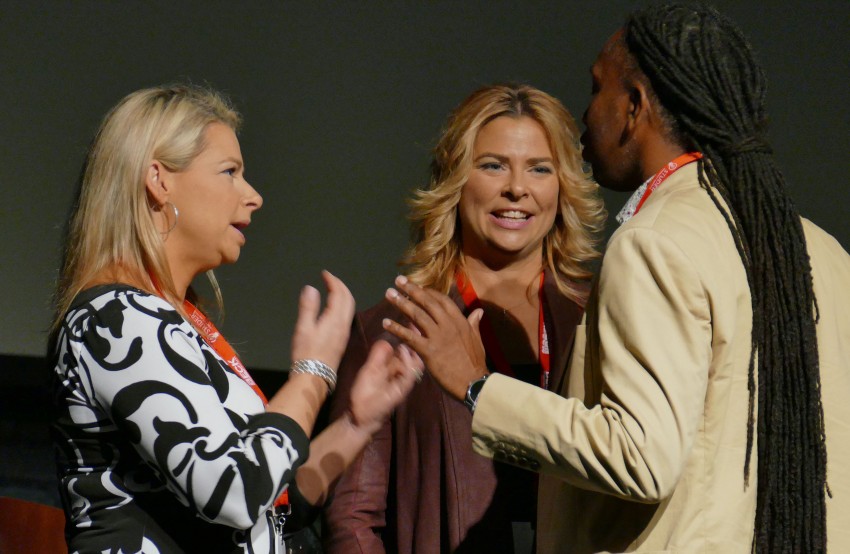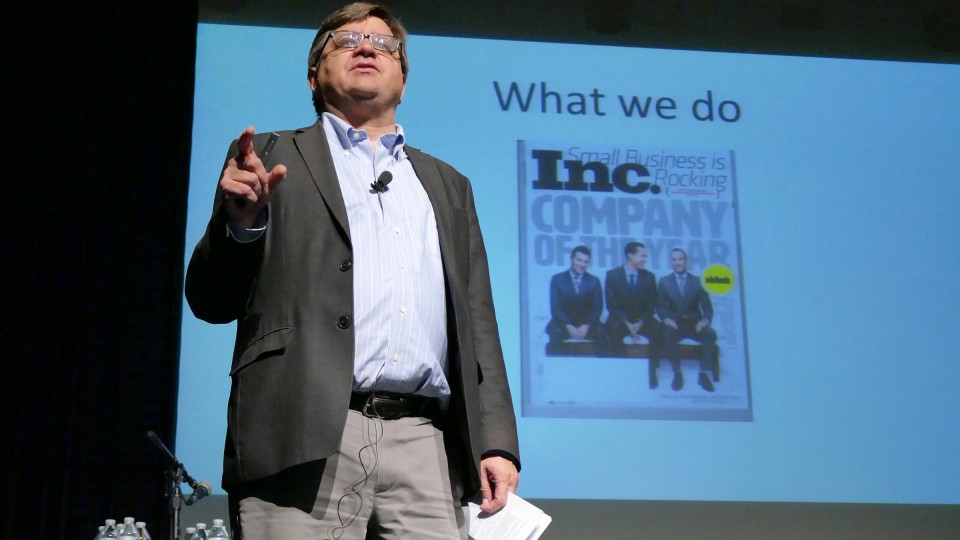EntreCon: Hire well, build culture, embrace disruption
- November 5, 2015
- / Carlton Proctor
- / economy

Audience members follow the conversation of some of the early speakers Thursday morning during the Entrecon seminar held at the Rex Theatre.
The CEOs of two of Pensacola's homegrown firms that have reached superstar status shared their success stories and management strategies, during an afternoon session of EntreCon.
Sponsored by the Studer Community Institute and the University of West Florida's Center of Entrepreneurship, the two-day business conference features local and nationally recognized experts on business start-ups, financing and executive management.
Michael Murdoch, co-founder of the web security firm AppRiver, and Bill Wein, CEO of IMS Expert Services, focused their talk on the challenge for a growing company to establish and maintain a common, goal-oriented culture that's embraced by all employees.
Both AppRiver and IMS Expert Services have made the Inc. 5000 list of fastest growing private businesses in the U.S. for 10 consecutive years.
"We've worked hard to develop a successful culture at AppRiver, a culture that goes over the top to take care of our customers," Murdoch said. "We've been able to take that culture and transplant it to our other offices in the U.S. and to Europe."
Murdoch emphasized the importance for a small, growing business to establish a strong culture for customer and product service.
"But the bigger we get, the harder it is to maintain that culture," he added.
Asked about mistakes he made along the way to building IMS, Wein said it's vital for a new business "to know where you are going, and hire people who know where you're going.
"If you don't transfer that clear vision, employees will take the company in their own directions," he said.
Both Wein and Murdoch agreed that getting employees to buy in to the CEO's vision is made easier and more lasting by being forthcoming about finances and growth strategies.
"It's very important to be very transparent to customers, as well as your management team," he said. "Tell them where you are going."
Murdoch also urged entrepreneurs and owners of start-up businesses to "learn from your mistakes."
"The best thing about failures is to learn from them," Murdoch said. "Stay focused, and if you find something in your business that's not working, fail quickly and move on."
Wein and Murdoch left the audience of about 50 with some parting words.
"Do what enjoy, enjoy what you do, be persistent and make sure you're always asking yourself if you're moving in the right direction," Murdoch said.
Wein urged entrepreneurs and owners of small growing businesses to "always keep your eyes open to next big thing. And listen to your clients."
Later in the day restaurateur Joe Abston, and Katie Garrett, owner of Old Hickory Whisky Bar, talked about the challenges of being in the food and drink services business.
Because of the intense person-to-person nature of a restaurant or bar, Garrett and Abston stressed the importance of hiring "people you trust, and are honest."
But she also warned of letting friendship interfere with sound business decisions.
"I think one the mistakes I made early was holding on to a relationship with an assistant too long," she said.
Abston said it's also vital for someone going into the restaurant business to "invest in a good location."
A great concept for a bar or restaurant often is no better than its location, he said.
EntreCon's morning session featured Inc. Magazine editor Jim Ledbetter who talked about "disruptive industries."
"We are living in an era of disruption," Ledbetter said. "We're seeing that the fastest growing businesses in this country are overthrowing and challenging established industries.
"As entrepreneurs, you want your business to be disruptive," he added.
Ledbetter said "disruptive" businesses:
— Create an entirely new market. For example, Airbnb owns no property. It is a market that was created from nothing more than a good idea executed.
— Grow rapidly. He cited the discount broker Charles Schwab as one of the first examples of a disruptive business that took on the large, heavily capitalized brokerage houses.
— Always start unnoticed, and generally do not show up the on radar of companies that will be most affected. It starts on margins and grows incredibly rapidly.
— Require a different level of response other than merely being innovative. Disruption takes established industries and turns them on their heads.
"Disruption almost always looks unattractive, so it's easy to dismiss," Ledbetter said.
Ledbetter said reactions to disruptive businesses you hear most often from existing companies are:
— That's illegal (think Napster, Uber).
— Those margins are terrible (Charles Schwab).
— That's a lousy business model (Amazon).
— That's not even in our business wheelhouse (Trip Advisor).
Each one of the above disruptive companies have achieved huge success because it put the crowd in charge.
"The crowd is now in charge, and that's the major source of disruption in business today," he said.
Following Ledbetter were Chanda Bell and Christa Pitts, co-founders of Elf on the Shelf publishing company.
Bell said the company, started more than a decade ago, evolved out of a family Christmas tradition that was put in story form, self-published, and then evolved into a major international publishing and product distribution company.

Elf on the Shelf creators Chanda Bell and Christa Pitts spend a few moments talking with Chava Roshell following their talk before the audience at Entrecon Thursday.
Their story of Elf on the Shelf was truly one that started around a kitchen table, Pitt said.
"We wrote about our family tradition, and we thought it would be something good to share with other families," she said.
Their success was slow and laborious, but it was underscored by determination, belief in the product and tenacity, three traits that any entrepreneur should have before going starting a business.
"No one will be bigger proponent for your brand than you," said Pitts. "You are the most important driver behind your idea."

 CivicCon launches with a look at good growth in cities
CivicCon launches with a look at good growth in cities
 Building stronger brains one baby, one parent at a time
Building stronger brains one baby, one parent at a time
 SCI debuts commercial on Early Learning City
SCI debuts commercial on Early Learning City
 Entrecon: World class speakers and an opportunity to sharpen skills
Entrecon: World class speakers and an opportunity to sharpen skills
 PYP Quality of Life survey 2017
PYP Quality of Life survey 2017
 EntreCon Pensacola 2016: A look back
EntreCon Pensacola 2016: A look back
 Leadership tip: getting better employee takeaways
Leadership tip: getting better employee takeaways
 Leadership tip: be interested instead of interesting
Leadership tip: be interested instead of interesting
 Leadership tip: delivering difficult messages
Leadership tip: delivering difficult messages
 Brain Bags boost Arc, Early Childhood Court programs
Brain Bags boost Arc, Early Childhood Court programs